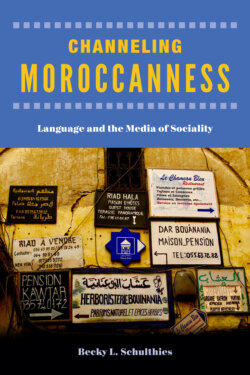Channeling Moroccanness

Реклама. ООО «ЛитРес», ИНН: 7719571260.
Оглавление
Becky L. Schulthies. Channeling Moroccanness
Contents
Note on Transcription and Translation
Introduction
Lamenting the Failure of Communicative Channels
Moroccanness and Channel Failures
Media and Relationality
The Linguistic Labor of Relationality in Fez
Mediating Me
Media, Politics, and Publics
1. A Fassi Linguascape
2. Literate Listening
Media Channel Ideologies: Seeing, Hearing, Believing
Moroccan Literacies and Critical Reasoning
Literacy and Awareness
Distributed Literacy: Affective and Effective Reasoning
Literate Listening Moroccanness Projects
Conclusion
3. Reregistering Media and Remediating a Register
Moral Rhythms of Storytelling: Market Circles and Domestic Spaces
State Storytelling, Public Television, and Civic Education
Storytelling Speech: Gender Equity Tales
Evaluating Speech of the Past: كلام الزمان (Klām Azzamān)
Conclusion
4. Scripting Sounds and Sounding Scripts
The Sounds of Writing
Platform Language Ideologies and Nonstandard Arabic
Orthographic Heterogeneity: Many Ways of Writing the “Same” Sounds
Hearing WrittenDarījain WhatsApp
WrittenDarījaLinguascapes in Fez
Newsprint Publics: The Politics of WritingDarīja
Conclusion
5. Mediating Moroccan Muslims
Channels: Electronic and Linguistic Intermediaries or Parasites
Religious Discourse and the State’s Moroccan Model of Islam
Phatic Labor of Religious Discourses in Fez
Conclusion
Conclusion
Appendixes. Transcription Key for:
Full Transcript for Introduction Episode 2 “We are Not an Arab Country”
Full Transcript for Chapter 4:Hearing WrittenDarījain WhatsAppInteraction
Full Transcript for Chapter 5:Islam is a Religion of EaseFamily Interaction
Acknowledgments
Notes. Introduction: Moroccan Channels, Channeling Moroccanness
2. Literate Listening: Broadcast News and Ideologies of Reasoning
3. Reregistering Media and Remediating a Register: Moroccan Morality Tales
4. Scripting Sounds and Sounding Scripts: Senses, Channels, and Their Discontents
5. Mediating Moroccan Muslims
Conclusion: Opening and Closing the Channels
Appendix
Index
Отрывок из книги
CHANNELING MOROCCANNESS
An Arab student of mine pointed out that the use of the term “Modern Standard Arabic” (MSA) vs. alfuṣḥā was an educational shibboleth; it demonstrated what kind of Arabic training one had. Instead of using my own terms, I opted throughout this book to use Fassi terms for the main language forms I analyzed: l‘arabīya (Arabic) often contrasted with français (French), darīja (Moroccan Arabic) often contrasted with fuṣḥā (formal “literary” Arabic). But these were not fixed registers: they were classifications that did important social work, as you will soon read.
.....
Selma’s ḥabib,20 her maternal uncle, had gathered us all on Sunday to enjoy a meal together in the village on the outskirts of Fez where he lived and operated a public communal bath house.21 Sunday, persisting in as a vestige of French colonial bureaucratic structuring, was the primary day off during the Moroccan work week. Most public employees and many in the private wage-labor sector lived and worked in the populist neighborhoods of the ville nouvelle, “new city” French-designed urban quarters away from the centuries-old walled medina of Fez. They enjoyed only one full day off on the weekend: Sunday. I was staying with Selma’s family, and so accompanied them to the family feast.
Selma’s mother was divorced and raising her three teenage children on whatever income she could gather as a housekeeper—which included taking in me, a foreign boarder. Selma was eighteen and finishing up her baccalaureate (high school) education. I had come to know Selma through a mutual friend who knew both of us were looking for a place to live. We were all living temporarily at the mercy of this mutual friend, whose father had died and left the family villa22 vacant while siblings disputed how to divide their inheritance. The friend offered to let us stay in the house until it could be sold. This makeshift domestic space immediately included satellite television serving as a significant contributor to family routines, discussions, and perceptions. It was on most of the time, before everyone left for school or work and as soon as anyone returned, adding to the soundscape streaming through the open windows: cars in the street, Arab music videos, kids playing soccer in the alley, Arabic-dubbed Mexican dramatic serials, neighbors chatting over afternoon tea, Moroccan talk shows, the hiss of a pressure cooker preparing a Ramadan meal on the gas stove, French-dubbed Hollywood and Arabic-dubbed Bollywood films, impassioned laments about the latest political issue, the cascading echoes of the Maghrib (sunset) call to prayer from surrounding mosques alerting us it was time to gather and break the fast—echoed a few minutes later by the call to prayer on national television.23
.....